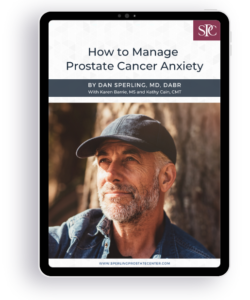Here’s a question you might not think to ask: Can I exercise my worries away? Specifically, if you’re on Active Surveillance for prostate cancer (PCa), what’s the best way to “work out” any anxiety you might be having?
For cancer patients, or even people who have a weird symptom and think it might be cancer, anxiety is a fact of life. There are few people who can simply switch anxiety off by telling themselves not to worry. Anxiety is a spontaneous neurochemical reaction to change, a throwback to our remote ancestors whose survival depended on fast awareness of threats. Such sensory awareness triggered lightning quick release of biochemicals and electrical nerve messages even before conscious thought kicked in. In that sense, anxiety is an unconscious, immediate response to something that unsettles us. What can be more unsettling than the threat of cancer?
Active Surveillance and anxiety
During the past several years, there’s been a surge in the number of PCa patients who go on Active Surveillance (AS). Being diagnosed with early stage, low-risk disease qualifies men for AS, a strategy to defer having a treatment that could put their sexual and urinary performance at risk. Besides having appropriate disease parameters, such patients should also be mentally prepared to live with the possibility that their cancer may grow or progress. AS monitoring is designed to watch for any warning signs of increased PCa activity, which would in turn trigger a repeat biopsy, and then treatment if warranted.
No matter how psychologically prepared an AS patient may feel, chances are there’s an undercurrent of stressful worry, as if living with a time bomb but not knowing what the clock setting is. As it turns out, there’s a powerful antidote to fear and worry in the form of vigorous exercise.
Exercise as an antidote for anxiety
A new study out of the University of Alberta (Edmonton, Canada) explored the effect of high intensity interval training (HIIT) on anxiety and stress stemming from living with PCa, worry about the disease progressing, other mental health outcomes such as fatigue and self-image), and any change in PCa factors.
The study involved randomization of 52 patients on AS into two groups:
- The HIIT exercise group had 12 weeks of supervised HIIT 3 times per week, which included a warm-up followed by alternating vigorous walking/jogging with active recovery, followed by a cool-down and stretching.
- The usual care (UC) group was asked simply to continue whatever they normally did to exercise.
All participants were given a battery of questionnaires and PSA testing at baseline, and again after the 12-week study program, in order to evaluate changes in psychological health and PSA.
The study team found that “HIIT significantly reduced total PCa-specific anxiety…and fear of progression… compared to the UC group.”[i] One of the coauthors is reported as stating, “Previous reports have suggested that exercise might help to manage anxiety in other cancer patient groups but our study is the first to show improvement in anxiety and fear of cancer progression experienced by men who opt for active surveillance.”[ii] It’s reassuring to know that in addition to the physical benefits of exercise for cardiovascular and metabolic health, exercise is shown to reduce the stress and worry that can accompany AS.
The Sperling Prostate Center offers Focal Laser Ablation (FLA) as a middle-ground alternative to AS for patients who aren’t at peace with the idea of harboring PCa in their bodies. FLA is a minimally invasive, outpatient procedure in which MRI guidance is used to target a PCa tumor for laser destruction, while preserving healthy tissue, continence, and sexual function. It offers the cancer control of more aggressive treatments, and is followed up with monitoring similar to AS once the tumor has been destroyed.
In addition, our Center always supports exercise as one component of total men’s health. Don’t wait for a diagnosis of prostate cancer, or any other medical problem, to embrace a consistent exercise schedule. It’s in your best interest on all levels: physical, emotional, and psychological. As Nike succinctly puts it, “Just do it.”
Download Our Free Ebook: “How to Manage Prostate Cancer Anxiety”

Don’t let anxiety over prostate cancer run you. Instead, learn how you can take charge and empower yourself to manage stress and boost positive treatment outcomes with our “first aid kit” of practical tips and tools.
NOTE: This content is solely for purposes of information and does not substitute for diagnostic or medical advice. Talk to your doctor if you are experiencing pelvic pain, or have any other health concerns or questions of a personal medical nature.
References
[i] Kang DW, Fairey AS, Boulle NG, Field CJ et al. Effects of Exercise on Cardiorespiratory Fitness and Biochemical Progression in Men with Localized Prostate Cancer Under Active Surveillance: The ERASE Randomized Clinical Trial. JAMA Oncol. 2021 Oct 1;7(10):1487-1495.
[ii] “Exercise may cut worry of active surveillance for prostate cancer.” Renal & Urology News, Mar. 25, 2022. https://www.renalandurologynews.com/home/news/urology/prostate-cancer/exercise-may-cut-worry-of-active surveillance-for-prostate-cancer/


